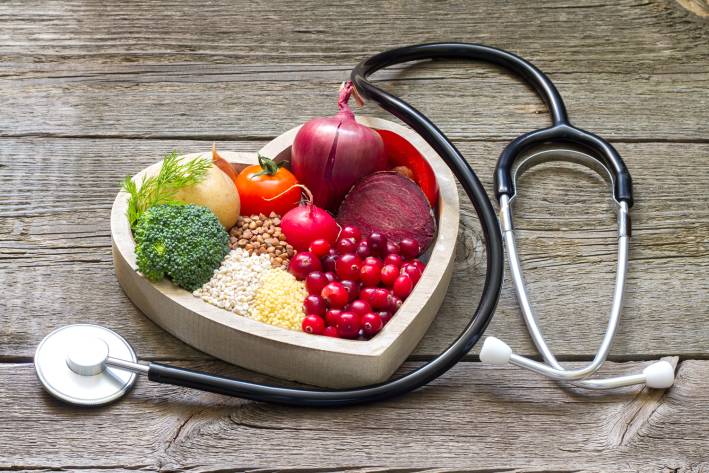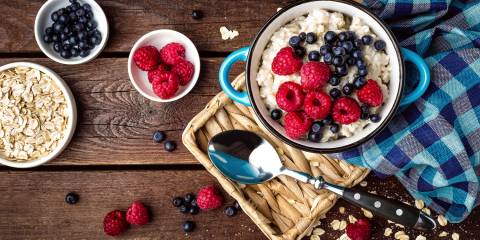A healthy heart—along with weight management—tops the list of health concerns for adults. In fact, close to 85 percent of Americans 35 to 65 years old are concerned about their tickers.
If this includes you, read on to learn which foods are best for your heart.
Begin with Breakfast
Eat breakfast. It fires up your metabolism and encourages the consumption of three balanced meals, not just one or two large ones, according to Malissa Wood, MD, author of Smart at Heart.
- If you’ve never been a big breakfast eater, Dr. Wood suggests starting with whole-grain cereal or toast twice a week. Whole grains are rich in fiber, which can help prevent heart disease.
- Or start the day with a bowl of oatmeal. Oatmeal is rich in soluble fiber, which absorbs cholesterol from the bloodstream and helps lower LDL (bad) cholesterol.Top oatmeal with heart-healthy berries. Stephen T. Sinatra, MD, author of The Sinatra Solution, recommends blueberries and blackberries, but all berries are great for vascular health. Other heart-healthy oatmeal toppers include flaxseeds and walnuts, almonds, or macadamia nuts. They’re all rich in healthy omegam3s and increase fiber.
- Replace orange juice with cranberry juice. Regular consumption of this juice may have anti-inflammatory and antithrombotic actions. Cranberry juice may also reduce your body's production of the compound osteocalcin. Osteocalcin has been associated with artery hardening.
Lunch Break
- Those who consume healthy fish regularly have a reduced risk of heart failure. Start with a piece of sustainably sourced wild salmon, which is rich in omega-3 fatty acids. Aside from salmon, try trout or herring. Enjoy these varieties twice a week for the most benefit.
- Salads are a great way to get a lot of heart-healthy ingredients in one meal. Sprinkle salads with pumpkin seeds or crumbled tofu. Both are great sources of magnesium, which helps relax the heart. Beans are a filling choice. They also don’t have the saturated fat and cholesterol found in meats like beef, pork, and lamb.
- Add avocado to your sandwich. Containing monounsaturated fat, avocados allow for the absorption of carotenoids—especially beta carotene and lycopene—which are essential for heart health, says Dr. Sinatra.
Snack Attack
- For a mid-day snack, munch on pecans. A Journal of Nutrition study found that eating these nuts doubled the level of antioxidant compounds in blood plasma and reduced oxidation of LDL cholesterol by a third. LDL cholesterol is known to contribute to plaque formation, which can then lead to heart attacks, stroke, and blood vessel blockage.
- Magnesium-rich fruits make good snacks too. Try figs, apricots, and bananas.
- Avoid milk and white chocolate. Instead, choose dark versions—the darker, the better. The cocoa compounds in dark chocolate reduce blood pressure and may help guard against cardiovascular disease.
Dinner Ideas
- Dine on lentil soup. Lentils are rich in folate. This vitamin is crucial to keeping blood homocysteine at a healthy level, which benefits the cardiovascular system. Season the soup with turmeric, ginger, garlic, and onions. With anti-inflammatory and blood-thinning properties, these additions can help protect the heart.
- When serving dinner, make sure the plate is half full with vegetables. Good choices include spinach and broccoli. Both are high in coenzyme Q10, a nutrient beneficial for the heart.
- For the rest of the plate, include one quarter lean protein (chicken or fish—also good sources of coenzyme Q10)) and one quarter whole-grains (whole-wheat pasta, brown rice). Consuming plenty of whole grains may have a cardioprotective role. One study found that serum total and LDL cholesterol—two important risk factors of cardiovascular disease—increased when people ate refined wheats, but not when they consumed whole-grain wheat.
- Enjoy family favorites like pizza, but go light on the cheese and instead add flavor with vegetables. For an authentic, salty flavor add some sardines, which are rich in omega 3s.
- Stay away from partially hydrogenated vegetable oils to reduce trans fats in the diet. Cook, saute, and bake with heart-friendly coconut oil instead. This oil is solid at room temperature, but can be heated until it liquefies.








